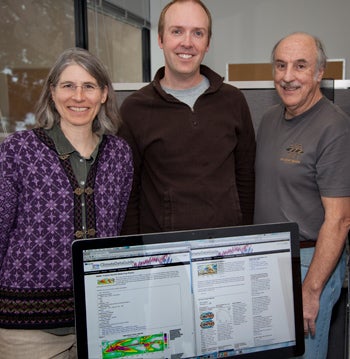New help for navigating climate data
The Climate Data Guide makes its debut
Feb 8, 2012 - by Staff
Feb 8, 2012 - by Staff
February 8, 2012 | The growing array of tools at the disposal of climate scientists doesn’t necessarily make life any easier for them. For example, each set of data has its idiosyncrasies, some of which aren’t evident at first glance. While a number of websites provides ready access to a variety of datasets, a group of NCAR scientists decided to go a step further. With NSF support, they recently launched the Climate Data Guide.
At the heart of the site, dozens of datasets and related resources—climate indices, reanalyses, model diagnostics, and more—are profiled with succinct, readable descriptions of their key features, strengths, weaknesses, and typical uses. Casual visitors can browse through all of the material. Those who become registered users (including students, researchers, and other stakeholders) can post their own comments, questions, and links. For example, they can sign up as experts on a given dataset and add their own perspectives to the descriptions.

Clara Deser, David Schneider, and Dennis Shea led the creation of the NSF-funded Climate Data Guide.
“Our hope is that the site will be a living repository for the climate community’s collective wisdom and expertise on a broad array of observational datasets and their appropriate use in analyses and model evaluation,” says principal investigator Clara Deser. Participants to date have included graduate students, scientists and professors, energy professionals, data managers, and staff from nongovernmental organizations.
The site’s soft launch in mid-October was boosted when co-PI Kevin Trenberth mentioned it in his plenary talk a few days later at the World Climate Research Programme’s Open Science Conference. “That ten-second plug for the website was seen by over 1,500 climate scientists,” notes David Schneider, who oversees the site’s day-to-day workings with NCAR colleague Dennis Shea. A thumbs-up from the RealClimate website helped bring in more than 100 registered users.
Now, says Schneider, the focus is on expanding the website’s content. This will include a close look at the observational datasets used to diagnose the performance of the Community Earth System Model.
Schneider encourages experts to bring their knowledge to the table. “This type of wisdom about datasets and their applications is difficult to capture in a Google search or a quick review of the literature,” he notes. “There is really a hunger for this information. We can’t provide all of it on our own—the community needs to be involved in order for the site to be of most benefit to everyone.”